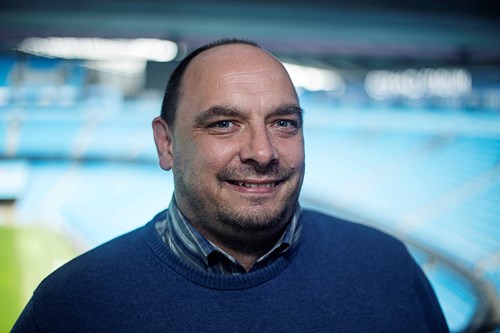UCFB Etihad Campus academic and former professional footballer at Manchester United and Exeter City Alan Tonge has bravely shared his personal struggles after being forced into early retirement from the game due to a life-altering injury.
Ahead of this year’s Clearing process, he speaks of how important it is that young, aspiring footballers don’t neglect their education while playing and how his return to studying helped transform his life…

The psychological effects of having to experience and move on from injury forcing an early retirement cannot be underestimated. After joining Manchester United at 14 years old and then moving on to Exeter City at 19 progressing through the junior teams, youth teams, reserves and into the first-team environment the journey formed a large part of my identity.
Throughout my childhood and adolescence, I dedicated myself to becoming the best I could be and a large part of this was seeing myself as a footballer. When this got taken away through a serious injury at 22 years old, I was left in a void and for a number of years became a shadow of my former self. The sense of purpose and meaning that I had held for a long time had vanished and my daily routine and structure was gone.
I had a difficult few years after leaving the game suffering with depression owing to a complete loss of my identity. My fitness started to go, my diet was poor and I ended up falling into bad habits such as drinking more than I should have and spending too much time in bookmakers. I ended up feeling confused and afraid as I simply did not know what to do next. When you are used to training most days and competing a couple of times a week and that is not there anymore, the motivation is low and the frustration is high. Sadly, the emotional support was poor too and I ended up feeling isolated and alone. I was trying to replace the feelings that I had through football into something else and there is not much that can compare. My family were fantastic but I needed some professional guidance at the time in order to help clarify next steps. Sadly, there was nothing forthcoming.
Thankfully, throughout my early years and into my apprenticeship at Manchester United, I had kept engaged with my education. I am so glad I did because many players did not see the importance of education at the time and did not bother turning up to college, preferring to go and play pool or look around shops. This element gave me a broader sense of identity and a sense of perspective giving me something to focus on away from professional football. Out of the 12 apprentices in my year group, there were only two players who passed that college course with me being one of them. This would pay off for me later on down the line. It gave a me a little bit of balance and kept me grounded. This aspect most definitely helped me transition into another career.
Well on track to pull the boots on once again for a charity football match and most importantly to raise some much needed funds for mental health support and @ManchesterMind. Been grafting away getting the timber down! It’s on! ☺️ pic.twitter.com/vXoOYJp9Rw
— Alan Tonge 🐝💙 (@Alan_Tonge) May 21, 2021
Professional football is a unique culture and is similar to the military in that many external people are interested in it, want to talk to you about it, recognise your skills and even what it took to get there and perform, but it does not qualify you to do anything else. When I had to transition out of football, the organisational structures in clubs were very different and the playing staff/ coaching and support staff were smaller. These days there are more options as sports science has evolved and there is interest in players right down to as young as four or five years old. This has helped with career opportunities in many areas such as coaching, strength and conditioning, performance analysis, sport psychology, medical and scouting/ recruitment. When I had to finish, the options to stay in football were extremely limited and it was if a big, heavy door had closed on me.
After a few years lost doing a range of part-time jobs to attain some income (such as coaching, warehouse work and driving) I decided to re-engage with my education and head back to university and complete a degree in sports science. It was the best decision I ever made and got my life moving again. After finishing my degree, I undertook a teacher training qualification (PGCE), a MPhil in sport psychology and have just completed a PhD. My research examines the psychological challenges that players face whilst navigating their way through the game and how these challenges can impact their identity, mental health and well-being. I have also had a couple of book chapters and academic material published and currently do some football commentary work on BBC Radio Manchester (Manchester United related) and BBC Radio Devon (Exeter City related).
I also do some charity work to raise money for Manchester Mind and am heading into my nineteenth year of teaching! After having to come out of professional football early, this has certainly flown by! I think it was John Lennon who said ‘life is what happens to you whilst you’re busy making other plans!’ One of the most enjoyable aspects of my teaching role at UCFB is that I love working with and seeing young people develop and most importantly make a real difference in the communities that they serve. I have been privileged and so lucky to work with some outstanding people.
My message to any young player or professional athlete striving to make a career is to have something else which sits outside of your current role as a footballer. This could be anything from courses, coaching awards, learning a language, learning to play a musical instrument, working with a charity or setting up a foundation to develop others etc. Anything constructive that will help you form a broader identity and provide you with some more options if football does not work out. It will most definitely help you with the transition when that time comes. Love your football of course, but love your whole life too. If playing football has to finish, this doesn’t mean you have to finish! Keep going, reflect, dig deep and never give up! With the right desire and attitude, some wonderful opportunities to do other things are never far away from your grasp.

















